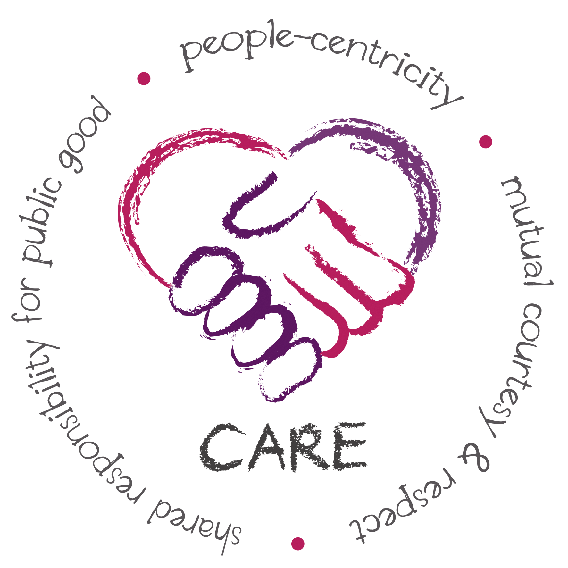A New Paradigm for the Delivery of Public Services
ETHOS Issue 12, June 2013

Introduction
In recent years, there has been a sharp escalation in public interaction with government agencies. Public agencies have experienced quantum jumps in feedback volumes and service requests.
The nature of feedback and expectations of government responses have also become more complex. This is in part because a better educated, better informed and more sophisticated citizenry have come to expect greater responsiveness, accountability and personalisation in services. They also expect public agencies to have more empathy and understanding of their individual needs.
All this calls for deep reflection on how the Public Service should improve — or where necessary overhaul — its services. To be sure, we have achieved a high level of efficiency in service delivery to date, but the Public Service will need to re-examine its service paradigm, and consider how to evolve further to meet the changing needs of our people.
Reframing Public Services: From Transactional to Relational
In 2011, the Public Service’s Service Principles were expanded to include People- Centricity, Shared Responsibility for Public Good, and Mutual Courtesy and Respect in addition to CARE.1 This was done in acknowledgement that our compact with the people is changing. It is no longer sufficient to provide transactional services alone.
Achieving the principles will require a shift towards a more relational form of governance. Apart from trying to understand our customers better and seeing things from their point of view, we also need to proactively look for well-rounded solutions that can better meet their needs.

The Service Principles for the Singapore Public Service
People-Centricity
Public agencies have sought to be more people-centred, by infusing citizen perspectives into policymaking and service design. The Ministry of Manpower and the Housing & Development Board, for example, studied how their counter services could be delivered with greater customisation and sensitivity to their customers. The Public Service Division (PSD) introduced the First Responder Protocol in 2012, complementing the No Wrong Door policy, to ensure that public requests and feedback are expediently addressed by Government as a whole, even if the right agency was not the first to be approached. This was particularly necessary for issues that do not fall neatly within a single agency’s purview. Such initiatives reflect our desire to create convenience for our people, and to make government services more useful from the perspective of the citizens and customers who use them.
Relationships and Mutuality: A Two-Way Street
Is there a limit to how far the Public Service can go towards being people- centric? Public resources are finite: manpower and financial resources are already being stretched to cope with the increasing volume and complexity of requests. The fact is that government agencies will not be able to accede to every request.
While the Public Service strives to be more people-centric, it has also to ensure that Singapore remains well-governed, that our procedures are fair, and that no one gets short-changed because of undue attention to the demands of a few. A minority of customers can also be especially insistent, even unreasonable, with their demands, sometimes resorting to threats and verbal abuse of service staff, which is clearly unacceptable.
We are seeing more cases of abusive behaviour towards front-line service officers, with customers throwing tempers and threatening staff when their requests are not granted. Where service interactions between public officers and customers become unproductive or abusive, it is necessary for us to halt interactions after appropriate service has been rendered.
PSD has developed guidelines on how agencies and officers may respond in such instances. This is to ensure that public resources can be freed up to serve other customers. We also need to protect our officers from unreasonable and abusive behaviour, and should not hesitate to take legal action against abusive behaviours where warranted.
Mutual courtesy and respect is fundamental for any constructive interaction. A relationship works best when there is respect and consideration for each other, coupled with the understanding that both parties are trying their best to achieve a common goal: in the case of public service, it is to arrive at the best possible outcome for both the customer and society.
The South Australia State Government makes clear on its website and in letters the overriding consideration why penalties for traffic offences are strictly enforced, and emphasises this again when rejecting waiver appeals: speeding kills lives.1 In doing so, they emphasise that individuals are personally responsible for the safety of their fellow citizens, and draw a line against people’s expectations to be excused for violations.
In the USA, the White House turned down a petition in November 2011 that asked for marijuana to be legalised and regulated in a manner similar to alcohol, notwithstanding the fact that the petition came with 75,000 signatures. This was decided on the consideration that use of marijuana is associated with addiction, respiratory disease and cognitive impairment, and would raise serious concerns about public health if the request was acceded to.2
Drawing A Line For the Public Good
The South Australia State Government makes clear on its website and in letters the overriding consideration why penalties for traffic offences are strictly enforced, and emphasises this again when rejecting waiver appeals: speeding kills lives.1 In doing so, they emphasise that individuals are personally responsible for the safety of their fellow citizens, and draw a line against people’s expectations to be excused for violations.
In the USA, the White House turned down a petition in November 2011 that asked for marijuana to be legalised and regulated in a manner similar to alcohol, notwithstanding the fact that the petition came with 75,000 signatures. This was decided on the consideration that use of marijuana is associated with addiction, respiratory disease and cognitive impairment, and would raise serious concerns about public health if the request was acceded to.2
Notes
- http://dpti.sa.gov.au/roadsafety/safer_speeds/new_speeding_penalties
- http://www.drugfree.org/join-together/advocacy/white-house-turns-down-petition-to-legalize-marijuana
Shared Responsibility and Community Ownership
The Public Service works to ensure a progressive society in which our citizens can thrive: a society aligned to the people’s wishes and ideals. Our citizens and residents are a necessary and rich source of feedback and ideas. Some members of the public are able and willing to go even further and co- develop public initiatives for the greater good. This should be encouraged. Both Government and the people should be partners in the development of society — as is represented by the clasping of hands in the Service Principles motif — each bringing their own perspectives, experiences and expertise to bear. Citizens who have experienced our policies and services can often offer good answers to the problems we are trying to solve.
Agencies come some way in co- developing solutions with the people. However, the Public Service can do more to foster creative partnerships, where appropriate, in which the Government plays the role of facilitator — not just regulator — by convening and clarifying public voices and choices in policy and service delivery.
Service Management in Public Sector Organisations
Service excellence cannot be the sole responsibility of front-line departments but must involve all parts of an organisation, and be empowered by its leadership, in order to effect real and palpable change to the citizen experience. In general, public agencies seeking to transform their service delivery should consider four general areas of development.
Service Leadership and Organisation Development
Leadership is critical for public agencies to effect a strategic shift towards service excellence. Senior leaders are responsible for charting a people-centric vision, building a service-oriented culture, and for providing strong support for staff contributions to service, particularly the efforts of front-line officers. Leaders need to emphasise that service is an important priority for the organisation, and demonstrate this by devoting management attention and resources towards service design and delivery. Internal organisational health is also integral to service excellence. In Singapore, the Quality Service Managers of public agencies are appointed from the ranks of senior management so they have enough influence to drive a culture of service excellence and change.
Partnering the Community
On 31 January 2013, the National Library Board (NLB) opened its first community-supported Library@Chinatown at Chinatown Point Mall. The library is funded privately by donors and run almost completely by volunteers. The library works with various community groups to organise programmes for library-goers, and this results in programmes which are better tailored for the community and more pertinent to their interests.
The Land Transport Authority (LTA) set up the Community Partnership Network (CPN) in 2007 to engage and co-create ideas with local communities on transport matters. The National Environment Agency (NEA) established a 3P Partnership Strategy to develop environmental programmes with the people and private sectors.
Integrated Sense-Making and Feedback Loop
For better customer insight, agencies should develop robust Customer Relationship Management (CRM) and data systems that integrate feedback and data from different sources. These systems should allow the agency to analyse trends and test hypotheses. In order for the data to be sufficiently rich and meaningful, divisional boundaries may need to be broken down through the sharing of information and supporting cross-unit projects. Feedback and data analyses should also be systematically looped into policy reviews and service improvements, and be surfaced regularly for leadership attention and decision. Effective sense-making and feedback loops will allow agencies to achieve significant improvement in service quality by enabling them to proactively identify and address customer needs.
People-Centred Service Design
Services should be designed with the customer experience in mind, and aligned to the needs and preferences of different customer segments. Part of service design includes simple and clear communication that facilitates understanding. Agencies should also make better use of technology (such as mobile applications, e-appointment systems, and automation of services) to create convenience for customers. These systems should be designed with intuitive interfaces that are easy to use and transact with. Where cases fall outside the scope of policy, there should be procedures to facilitate the handling and resolution of exceptions.
Service Capabilities and Support
Agencies should be prepared to make extensive investments in service capability building. Front-line officers and managers should be equipped with the skills, expertise and motivation for good service. Agencies should find ways to recognise their efforts, and to ensure the wellbeing of front-line staff. As the volume of customer transactions increases, operational practices can be improved to help balance the workload of these officers (such as through staggered deployment to better manage peak hour demand). Agencies should also seek to broaden development opportunities for service staff, such as through rotations across organisational functions or creating service specialist progression tracks.
One of the deep secrets of life is that all that is really worth doing is what we do for others.
—Lewis Carroll
Conclusion
As members of the Singapore Public Service, we should continue to strive to bring value to the people through the services we deliver. Nevertheless, bringing the new Service Principles to life in the next phase of service excellence will be challenging. Public sector leaders will need to continually refresh their service strategy, and chart out the next leaps of progress they intend their agencies to achieve. Public officers at every level need to understand the role they play in their organisation’s overall service strategy, and take personal ownership for achieving service excellence in their own field of influence. Front-line officers are of particular importance in this effort, and their conviction to serve, despite today’s complex and demanding environment, should be appreciated.
NOTES
- CARE stands for Courtesy, Accessibility, Responsiveness and Effectiveness.

